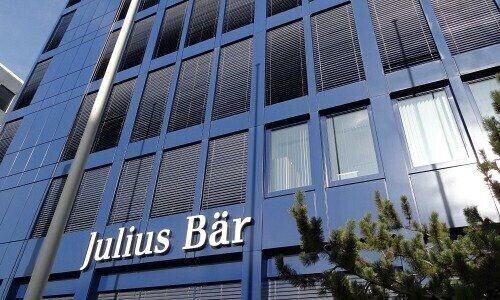After a record year in 2021, the Zurich-based private bank posted the second-best result in its history last year in a challenging environment. But assets under management which are critical for generating fees for the firm fell.
Julius Bear recorded an adjusted net profit attributable to shareholders of 950 million Swiss francs in 2022 ($1.04 billion), beating expectations but falling 12 percent short of the record result of 2021, the Zurich-based private bank announced Thursday. Still, it was the second-biggest profit in the firm's history.
A year ago, Julius Baer posted the largest profit in its history, when it increased by 55 percent to 1.082 billion francs ($1.2 billion), exceeding the one billion franc mark for the first time.
«We are closing the 2020-2022 strategic cycle with the second-best result ever. Across the period we have fundamentally transformed our business, mastered various challenges in the operating environment, and achieved all the financial targets we had set ourselves three years ago,» said CEO Philipp Rickenbacher.
Net New Money
New money inflows were also better than expected, as the bank attracted 8.7 billion francs last year, recovering from deleveraging at the start of the year and followed by «significant acceleration towards year-end,» according to the statement. In 2021, Julius Baer saw inflows of 19.6 billion francs.
In the year's second half, 9.8 billion francs of new money came to the bank, of which 6 billion came in the last two months. That more than compensated for the 1.1 billion of first-half outflows from deleveraging. Clients domiciled in Europe and the Middle East «contributed meaningfully» to the net new money result.
Negative Currency Impact
Assets under management (AuM), which are critical for generating fees for the firm, fell by 57.6 billion francs, or 12 percent, to 424.1 billion, although they fared slightly better than analysts expected in an «AWP» consensus for 420 billion. The decline was attributed to corrections in the global stock and bond markets, significant central bank interest rate highs, and a net negative currency impact.
The effect of corporate divestments on AuM was 7 billion francs which were mainly due to the completion of the sale of Wergen & Partner Wealth Management, and Fransad, among other transactions.
The decline in assets under management and lower client activity was offset by higher interest rates, which kept operating income stable, the bank said. The gross margin was 87 percent, compared to AWP expectations of 85.8.
Buybacks and Dividends
After 2021's record year, Julius Baer increased its dividend from 1.75 francs to 2.60 which it will maintain for 2022. In March of last year, the firm launched a 12-month program to repurchase 400 million francs with of its shares.
A payout ratio of around 50 percent of adjusted net profit attributable to shareholders is targeted. The dividend is subject to approval at the annual general meeting on April 13.
At the end of 2022, it bought back over 5.7 million shares at a combined cost of 276 million. It expects to complete the program by the end of this month.
Russia Exposure
The bank also provided an update on its risks and exposure related to Russia. After Russia invaded Ukraine in February of last year, Julius Baer said it applied all relevant national and international sanctions. It has not accepted any new clients with Russian residences.
It said its market exposure to Russia is insignificant and tightly managed and has closed its advisory subsidiary in Moscow.
At the end of 2022, Julius Baer said 2.2 billion francs of AuM were reclassified to Assets Under Custody (AuC) due to asset freezes and restricted client relationships. Around 0.7 percent of AuM were related to Russian persons who are not entitled to EU or Swiss residency.



































